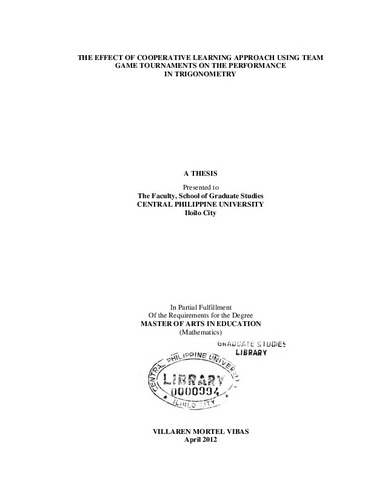The effect of cooperative learning approach using team game tournaments on the performance in trigonometry

Page views
828Date
2012Author
Thesis Adviser
Defense Panel Chair
Share
Metadata
Show full item record
Abstract
This study was conducted to investigate the effect of cooperative learning approach using team game tournaments on the performance in Trigonometry.
This experimental study was conducted from August 22, 2011 to October 14, 2011. The respondents of this study were the thirty - six fourth year high school students of Romblon State University, San Fernando Campus. The students were matched-paired on the basis of their final grade in Mathematics III to establish equality between two groups. The students were randomly assigned to the experimental and control groups by tossing a coin. Eighteen students were assigned in the experimental and eighteen also were assigned to the control group. The experimental group was taught using cooperative learning approach particularly team game tournaments, while the control group was taught using the traditional method. The subject matter, exercises, and tests were the same for both groups. Both classes were handled by the researcher in one hour classes at two consecutive time schedules.
The pre-test-post-test control group design was used in the study. Data were gathered using a 50-item teacher made test to measure the performance in trigonometry. Means, standard deviations, frequency counts and percentages were used for the descriptive analysis. T-test for dependent samples was used to determine the significance of the differences between the variables identified. The significance level of all tests was set at 0.05 level.
Findings
This study revealed that before the treatment, both the experimental group and the control group had the same performance level of fairly satisfactory. After the treatment, the performance level of the experimental group improved to very satisfactory while the performance level of the control group was satisfactory.
Using t-test for mean differences, the study showed no significance between the mean scores in the achievement test of the experimental and control groups before the treatment. However, a significant difference was noted between the mean scores in the achievement test of the experimental and control groups after the treatment. There was a significant difference between the pre-test and the post-test mean scores in the achievement test of the experimental group and that of the control group. Further, the results also revealed that there was a significant difference between the mean gains in the pre-test and post-test mean scores in the achievement test of the experimental and the control groups.
Conclusions
Based on the findings, both cooperative learning using team game tournaments and traditional method improved significantly the students’ performance in Trigonometry. However, the students who were taught using team game tournaments showed significantly better performance in Trigonometry compared to those students who were taught using traditional approach. The use of cooperative learning approach using team game tournaments in teaching Trigonometry had helped students developed concepts and mathematical skills better than the traditional method. The cooperative learning approach using team game tournaments is an effective strategy compared to the traditional method in teaching Trigonometry.
Recommendations
Since it is concluded that cooperative learning approach using team game tournaments is effective, this strategy is recommended to be used by teachers in teaching mathematics. This is also recommended to parents in helping their children follow up their lessons as well as to the students in participating in every math lessons using this strategy. The school shall provide improved facilities and venues for the applicability of the team game tournaments. The teachers shall however be trained how to use the strategy. It is also recommended that further studies on the use of cooperative learning approach using team game tournaments shall be conducted with more number of respondents in elementary and high school levels, longer time frame and wider scope of subject matter in different areas in mathematics. The use of cooperative learning approach may be tried in other subjects.
Description
Abstract only
Suggested Citation
Vibas, V. M. (2012). The effect of cooperative learning approach using team game tournaments on the performance in trigonometry (Unpublished Master's thesis). Central Philippine University, Jaro, Iloilo City.
Type
ThesisSubject(s)
Department
School of Graduate StudiesDegree
Master of Arts in Education major in MathematicsShelf Location
GSL Theses 378.242 P136
Physical Description
xii, 75 leaves



